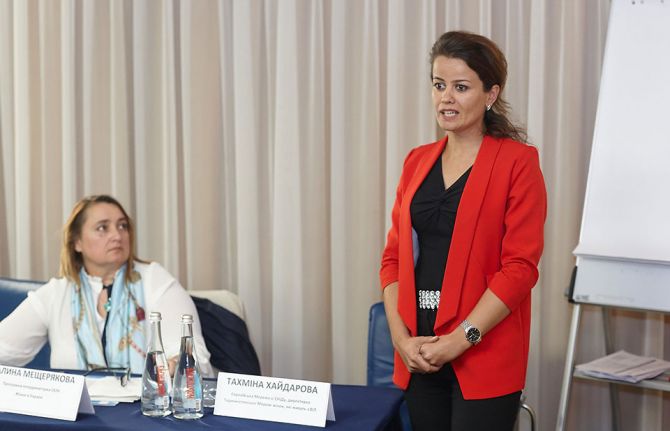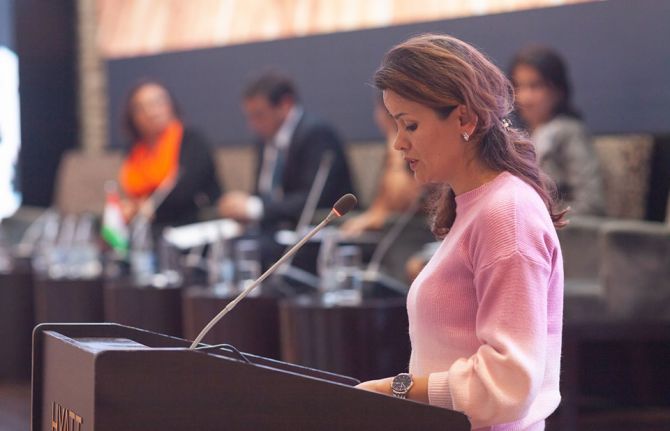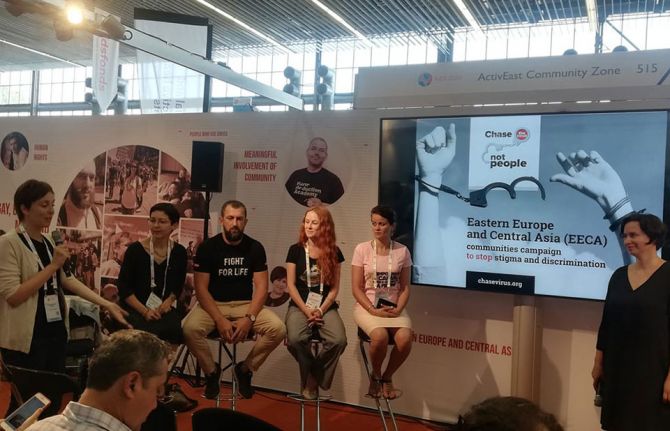



Feature Story
Breaking the vicious cycle of HIV-related stigma in Tajikistan
03 March 2020
03 March 2020 03 March 2020When Tahmina Khaidarova was married it was in accordance with her family’s cultural traditions—her parents chose her cousin to be her husband. She rarely saw her husband, who worked in another country, returning home to Tajikistan only for short visits once a year. When her little daughter fell seriously ill and died, she hoped to get pregnant again to ease the pain of her loss. During a medical examination, she was diagnosed with HIV. Soon her husband died of an AIDS-related illness.
Today, Ms Khaidarova is the Director of the Tajikistan Network of Women Living with HIV (TNW Plus), which educates women on HIV, protects their rights and breaks the vicious cycle of stigma against women living with HIV. She overcame her self-stigma and became a leader in fighting for the rights of women living with HIV in Tajikistan.
Ms Khaidarova explained that women who are aware of the risk of contracting HIV from their migrant husbands often can’t talk to them about using a condom. “I understand how serious the problem is, but I cannot ask my husband to use a condom, he will not understand,” one woman told Ms Khaidarova.
Women living with HIV in Tajikistan tell stories of discrimination. They can be driven from their home by their husband’s relatives and may be prevented from seeking medical services, including antiretroviral therapy and treatment for tuberculosis. They are also often subjected to domestic violence, with their husbands prohibiting their wives from seeking treatment or being told to leave their home, along with their children. After their husband’s death, they can endure violence and abuse by their husband’s family, especially in rural areas.
When women living with HIV seek help, they can face a new challenge—stigma and discrimination from health-care workers. Many women are told that they cannot have children in the future, or that they should only marry a man living with HIV or that they should not marry and have sex.
“Stigma and discrimination against women living with HIV can have devastating consequences. It can stop them accessing the health services they need, tear families apart and profoundly affect their ability to live a normal life,” said Ms Khaidarova. “Stigma and discrimination must be stopped, and stopped now!”
The need to counter stigma and discrimination against women in general and against women living with HIV has been recognized by the government. Women were included as one of the priorities in the national development strategy. The new national AIDS programme for 2021–2025 includes a separate block on human rights and reducing stigma and discrimination against women living with HIV.
To bring attention to the issue of HIV-related discrimination in the family, in society and, too often, in medical settings, Ms Khaidarova took part in the #InSpiteOff social media campaign. Featuring the right of women living with HIV in eastern Europe and central Asia to live with dignity and respect, the #InSpiteOf campaign featured Instagram stories showing different aspects of women living with HIV and challenged the stereotypes and myths that surround the virus.
A common feature of all the women featured in the campaign is that they were supported at a critical time in their lives by their loved ones, women’s organizations or communities and are now not only living with HIV and challenging society’s stereotypes, but helping others.
“I told my story in order to help those women who face the same challenges today. I strongly believe that we all together can break the vicious cycle of stigma against women living with HIV in Tajikistan. We have to cope with our own fear in order to fight stigma and discrimination in society,” said Ms Khaidarova.



